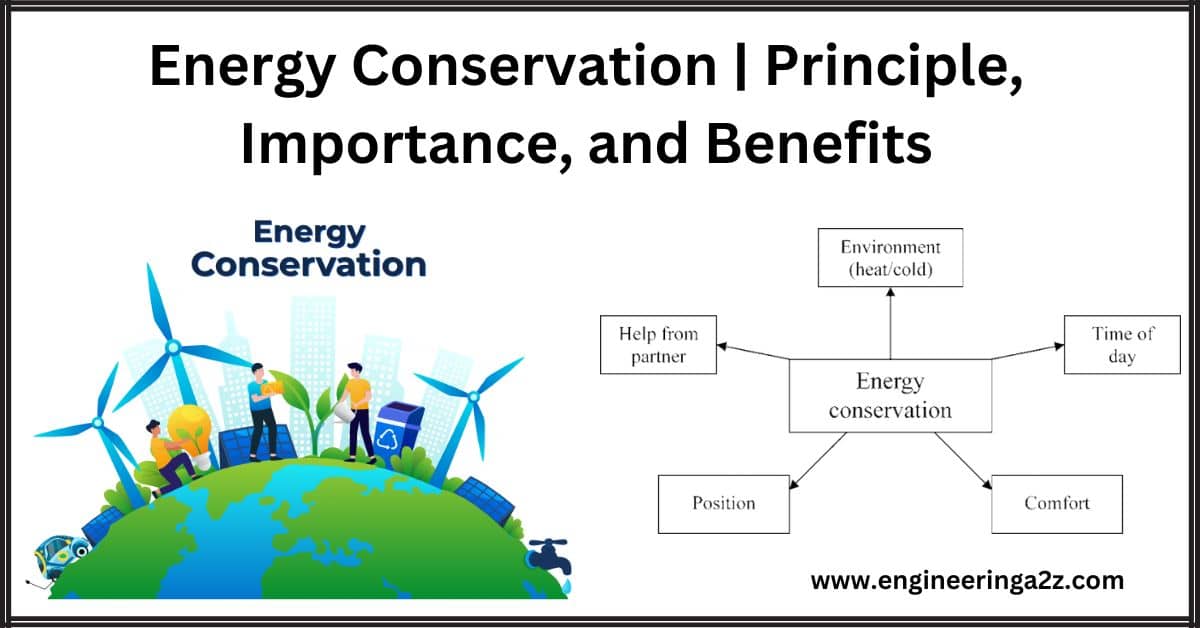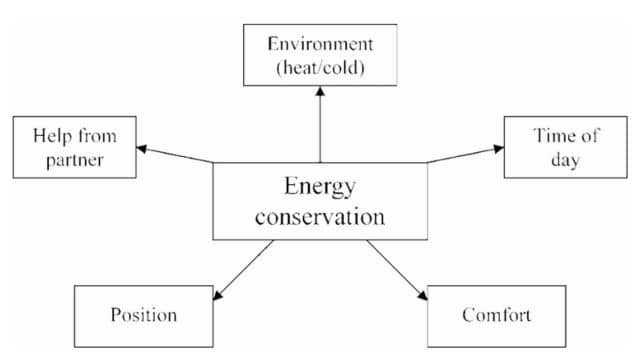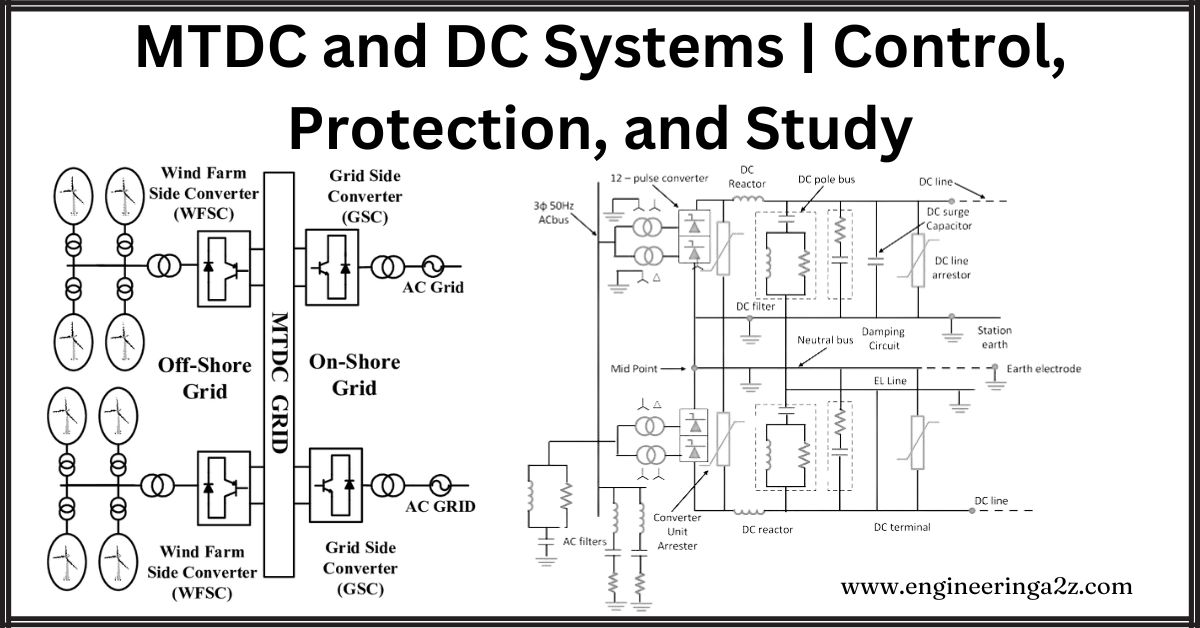
Table of Contents
Introduction
Energy conservation means using less energy by being smarter with how we use it. This can involve using energy in better ways or changing our habits to use less, like driving less. Efficient energy use has benefits, like cutting down on pollution and saving resources. Green engineering makes machines that turn energy into different forms last longer. We can save energy by stopping waste, making things work better with technology, and changing how we do things. Watching how we use things, figuring out patterns, and changing bad habits can help too. Different seasons affect energy use, like using more cooling in hot weather. Finding a balance between comfort and using less energy is important. Big things, like politics and technology, also affect how much energy we use.
Principle Of Energy Conservation
The principle of conservation of energy emphasizes that energy cannot be brought into existence or removed from existence. This means that within a closed system, the total amount of energy prior to any transformation remains equal to the total energy after the transformation. Several instances of energy transformation are illustrated below:
- Electric Bulb: Inside an electric bulb, the energy originating from electricity changes into both light and heat energy.
- Microphone and Loudspeaker: In a microphone, the energy of sound waves gets transformed into electrical energy. Conversely, in a loudspeaker, electrical energy is transformed into sound energy.
- Hydroelectric Plant: In a hydroelectric plant, water is allowed to fall from a height onto a turbine, causing the turbine to rotate. This rotation, in turn, moves a coil within a magnetic field, resulting in the generation of an electric current. Consequently, the potential energy stored in the water gets transformed into the kinetic energy of the turbine, which then changes into electrical energy.
- Battery and Bulb: Think about a battery like the ones in flashlights. Inside, chemical energy changes into electricity. When this electricity is used to light up a bulb, it transforms into light energy.
- Sun’s Energy: The sun’s power comes from nuclear reactions. It turns nuclear energy into light and heat energy, which is the warmth and light we feel from the sun. This also happens in other stars.
- Heating Stuff: Imagine heating something up, like a pan on the stove. The heat energy makes the tiny parts inside it move faster (kinetic energy). Some of this energy helps the substance expand, and some is used to do things like turning a wheel.
- Heated Filament: When you heat up a filament (a small wire), it releases tiny particles called electrons. This is called thermionic emission. The heat energy transforms into electrical energy as these electrons are set free. It’s a bit like heat making something give off electricity.
- Heating Appliances: Things like toasters, irons, and geysers work by using electricity to create heat. This means electrical energy becomes heat energy, which we feel as warmth from these devices.
- Bicycle Pump and Heat: When we use a bicycle pump, the energy we put in gets changed into heat energy. So, the pump becomes warm. Also, if we squish or stretch gas, the energy makes it hot or cold. Rubbing our hands together also creates heat because of the rubbing.
- Electric Motor: Picture an electric motor in a toy car. The electricity makes the motor spin, turning electrical energy into movement, like the car going forward.
- Generators and Dynamo: Some machines, like a generator or dynamos, use physical motion to make electricity. So, mechanical energy (motion) becomes electrical energy that we can use.

Motivation For Energy Conservation
Embracing energy conservation is a powerful step towards securing a sustainable future for both ourselves and the environment. The motivation behind energy conservation stems from the realization that our actions today directly shape the quality of life for future generations. By reducing energy consumption, we not only lower our utility bills but also contribute to the longevity of precious natural resources like fossil fuels.
This responsible approach helps us protect our planet, lessening our carbon footprint and curbing pollution. Every small effort to conserve energy, whether it’s turning off lights when not needed or using energy-efficient appliances, adds up to significant positive impacts. Ultimately, the motivation for energy conservation lies in our desire to leave a cleaner, healthier, and more prosperous world for those who will follow in our footsteps.
Here’s a simple motivation for energy conservation:
“Save for Tomorrow, Conserve Today”
By conserving energy now, we ensure a better future for ourselves and the planet.
Importance Of Energy Conservation
- Saves Money for the Country: When we use less energy, it saves a lot of money for our country. We spend a huge amount importing crude oil, which is around Rs. 1,50,000 crore per year.
- Saves Money for Individuals: Saving energy also saves money for individuals. Imagine if your cooking gas lasted longer or your electricity bills were lower – you’d have more money in your pocket.
- Limited Resources: Most of the energy we use can’t be replaced or renewed. About 80% of our energy comes from sources that will run out in about 40 years.
- Energy is Slow to Make: The main energy sources we use like coal, oil, and natural gas take thousands of years to form, but we’re using them up much faster than they’re being made.
- Efficiency Helps: Using energy sources like wood efficiently means we need less of it, and it’s easier to gather.
- Saving Energy Creates Energy: When we save one unit of energy, it’s like making two units of energy because we don’t need to produce as much.
- Less Pollution: Producing and using energy causes a lot of pollution and contributes to climate change. By saving energy, we reduce air pollution and harmful gases.
- Limited Resources in India: India has only 1% of the world’s energy but 16% of the world’s people. This means we need to use our energy resources wisely.
So, by conserving energy, we save money, protect the environment, and make sure we have enough energy for the future.
Benefits Of Energy Conservation
- Better Health: Saving energy reduces pollution that harms health, causing illnesses like asthma and even cancer. When we save fuel, we’re also taking care of each other’s well-being.
- Lower Costs: When people use less fuel or electricity, the prices go down, and everyone’s expenses become more affordable.
- Future-Friendly: By using less electricity now, we’re making sure there’s enough for future generations. It’s like planning ahead to have budget-friendly energy options.
- Helps Nature and Wildlife: Using less energy means fewer pollutants in the air from machines, vehicles, and power plants. Conservation also reduces harmful activities like risky extraction projects and spills, which helps protect the environment and animals.
- Fewer Power Plants: If we all save energy, there won’t be such a big need for building lots of power plants. This saves resources and prevents more pollution.
- More Independence: When we conserve energy, we rely less on far-away energy sources. This means we can count more on local and nearby energy supplies.
Frequently Asked Questions (FAQs)
What is Energy Conservation?
Energy conservation means using less energy in our daily lives. It includes simple actions like turning off lights when not needed, unplugging unused appliances, and choosing to walk instead of using a car. These actions help save energy and are good for the environment.
What are the advantages of Energy Conservation?
1. Energy conservation has these advantages:
2. Saves Money: Using less energy means lower bills, saving you money.
3. Preserve Fossil Fuels: By using less energy, we make our limited fossil fuels last longer.
4. Protects the Environment: Using less energy reduces our impact on the planet.
5. Less Pollution: When we use less energy, we produce fewer harmful pollutants.Do CFL and LED help in energy conservation?
CFL and LED lights are indeed great for conserving energy. They use less electricity compared to regular fluorescent bulbs, which means they help save energy effectively.
What are the benefits of energy conservation?
1. Saves Money: Energy conservation cuts costs and reduces your utility bills.
2. Preserves Fossil Fuels: It helps fossil fuels last longer by using them more wisely.
3. Environmental Protection: Energy conservation safeguards the environment.
4. Less Pollution: It reduces pollution and its harmful effects.
Read Also:
- Solar Collectors | Types, Advantages, and Disadvantages
- Biomass Resources | Environmental Impacts, Constituents, and Applications
- Modern Grid | Characteristics and Functions
- DIAC | Construction | Working and V-I Characteristics
- Overvoltage Protection | Internal and External Causes Of Overvoltage
- Earth Leakage Circuit Breaker (ELCB) | Types, Working Principle, And Construction





Leave a Reply